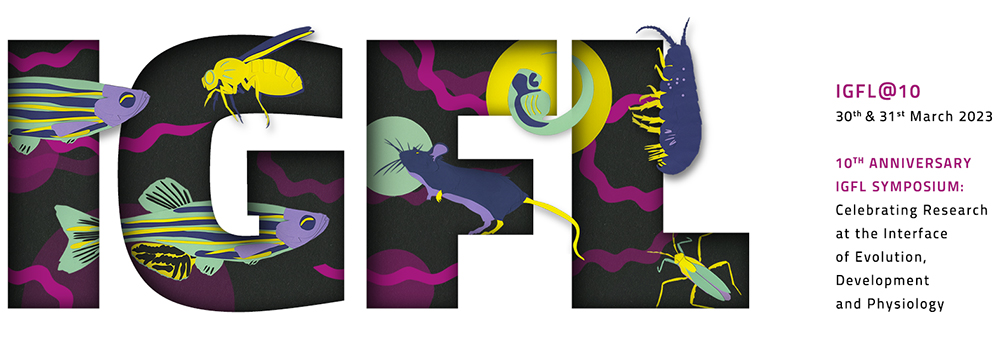L'historique de l'IGFL
 IGFL 2007 - ....
IGFL 2007 - ....
Les années 1990
La communauté scientifique considère qu'il est désormais possible d'aborder les sciences de la vie de manière intégrée. La "biologie intégrative" n'aborde plus les grandes fonctions biologiques de manière isolée, mais tente de décloisonner les disciplines scientifiques traditionnelles. Le CNRS a décidé de créer plusieurs centres de recherche en France pour développer cette nouvelle biologie. En raison de sa solide expérience dans ce domaine, Lyon a été incluse dans ce programme. Un projet de création d'un nouvel Institut européen de biologie du développement et de physiologie intégrative au sein de l'Université Claude Bernard Lyon 1 (UCBL) a vu le jour au début des années 2000, sous l'impulsion de Jacques Samarut. Parallèlement, la génomique s'impose comme une approche expérimentale et l'arrivée de Vincent Laudet à Lyon ajoute au projet initial les dimensions de la biologie comparative et évolutive. La création de l'Institut de Génomique Fonctionnelle de Lyon (IGFL) à l'ENS de Lyon en partenariat avec le CNRS, l'UCBL et l'INRA est décidée en 2006.
2007
L'IGFL est officiellement créé en tant qu'unité mixte de recherche de l'ENS de Lyon, de l'Université Claude Bernard Lyon 1, du CNRS et de l'INRA (aujourd'hui unité sous contrat avec l'INRAE). Les recherches menées par plusieurs groupes indépendants sont consacrées à la biologie du développement, à la physiologie et à la biologie intégrative. Les modèles intégratifs in vivo sont privilégiés. Jacques Samarut, directeur de recherche à l'ENS de Lyon et professeur à l'Université, est nommé directeur, Vincent Laudet est directeur adjoint.
Le premier logo de l'IGFL
Initialement conçu avec des équipes de l'Université Claude Bernard et du laboratoire Reproduction et Développement des Plantes (RDP) de l'ENS de Lyon, le projet repose finalement sur les groupes fondateurs du Laboratoire de Biologie Moléculaire et Cellulaire (LBMC)* dirigés par Vincent Laudet, Pierre Jurdic et Jacques Samarut. Ils ont été rapidement rejoints par cinq nouveaux groupes dirigés par Françoise Bleicher, Jean-Marc Vanacker, Catherine Hänni, Frédéric Flamant et Philippe Durand. Faute d'espace dédié à ce nouveau laboratoire, les équipes sont dispersées sur différents sites de l'ENS. La construction d'un nouveau bâtiment pour accueillir l'ensemble de l'IGFL est devenue une priorité.
*Nous tenons à remercier le Laboratoire de Biologie Moléculaire de la Cellule (LBMC), laboratoire créé en même temps que l'ENS de Lyon (1987) par Jacques Daillie avec Jacques Samarut comme instigateur. Le LBMC par une politique très ouverte intégrant les approches les plus récentes de la biologie de l'époque a été le catalyseur de la biologie intégrative et a eu un rôle majeur dans la création ou la relocalisation de laboratoires de biologie à l'ENS de Lyon : Le laboratoire Reproduction et Développement des Plantes (RDP) en 1993 dirigé par Christian Dumas, le laboratoire de Virologie avec Jean-Luc Darlix puis d'Immunologie avec Chantal Rabourdin-Combes, qui fusionnera dans le Centre International de Recherche en Infectiologie (CIRI) en 2013 et enfin l'IGFL. Sans le LBMC, ses succès scientifiques, son organisation originale (équipes indépendantes) et sa politique scientifique très large, l'IGFL n'aurait jamais vu le jour.
2008
Vincent Laudet est nommé directeur en mai suite à la nomination de Jacques Samarut comme directeur de l'ENS de Lyon (site Monod). Il ajoute la biologie évolutive aux précédents axes scientifiques de l'IGFL, ce qui se concrétise par l'arrivée de deux futurs chefs d'équipe : Jean-Nicolas Volff, recruté comme Professeur à l'ENS de Lyon et Laurent Viriot, recruté comme Professeur à l'Université Claude Bernard, et constitue ainsi le "trépied" thématique de l'unité, toujours d'actualité : Biologie du développement, Physiologie et Evolution. L'émergence des approches génomiques et d'imagerie dans les années suivantes ont été des facteurs fédérateurs très forts qui ont contribué à solidifier l'institut et à donner une "identité scientifique" à l'IGFL.
2009
L'IGFL met en place un Conseil Scientifique Consultatif (Scientific Advisory Board ou SAB) composé de personnalités scientifiques internationales de premier plan afin d'accompagner l'IGFL dans sa croissance par le biais d'appels d'offres ouverts et compétitifs pour la création de nouveaux groupes de recherche à l'IGFL, qu'ils soient seniors ou juniors. L'équipe de direction a engagé une responsable du pilotage de la recherche, Joanne Burden, qui mettra en place les 8 premiers appels. Le premier président du SAB sera le professeur Manfred Schartl (Université de Würzburg), suivi du professeur Ralf Sommer (Max-Plack-Gesellsahft), du Dr François Payre (Université de Toulouse), du professeur Irene Miguel-Aliaga (Imperial College London) et enfin du professeur Pavel Tomancak (Max-Plack-Gesellsahft). En 2022, notre SAB a de nouveau été présidé par le professeur Irene Miguel-Aliaga.
| 2009 | 2010 | 2011 |
| Manfred Shartl | Manfred Shartl | Manfred Shartl |
| Robert Feil | Robert Feil | Guillaume Belson |
| Lipo Huhtaniemi | Barbara Demeneix | Pierre Capy |
| Alex Mayer | Lipo Huhtaniemi | Barbara Demeneix |
| Stéphane Noselli | Alex Mayer | Robert Feil |
| Hugues Roest Crollius | Stéphane Noselli | Lipo Huhtaniemi |
| Roberto Di Lauro | Hugues Roest Crollius | Alex Mayer |
| Michel Milinkovitch | Sylvie Schneider Maunoury | Stéphane Noselli |
| Roberto Di Lauro | Hugues Roest Crollius | |
| Sylvie Schneider Maunoury | ||
| 2013 | 2014 | 2016 |
| Ralf Sommer | Ralf Sommer | François Payre |
| Hugues Roest Crollius | Hugues Roest Crollius | Hugues Roest Crollius |
| Marcelo Sanchez Villagra | Sylvie Schneider Maunoury | Paul Brakefield |
| Paul Brakefield | Paul Brakefield | Andreas Ladurner |
| François Payre | François Payre | Filipo del Bene |
| Joachim Wittbrodt | Joachim Wittbrodt | Irene Miguel-Aliaga |
| Angela Nieto | Angela Nieto | |
| Thomas Perlmann | ||
| 2018 | 2020 | 2022 |
| Irene Miguel-Aliaga | Pavale Tomancak | Irene Miguel-Aliaga |
| Paul Brakefield | Virginie Courtier | Walter Salzburger |
| Corinne Houart | Kristin Tessmar | Pavale Tomancak |
| Patrick Lemaire | Ilona Kadow | Ilona Kadow |
| Anamaria Nescuela | Hugues Roest Crollius | Patrick Lemaire |
| Patrick Lemaire | Marie Sémon |
Les deux premiers appels à projets permettent le recrutement d'Abderrahman Khila (2009) et de Florence Ruggiero (2010). Le programme ATIP-AVENIR 2010 de l'Institut National des Sciences Biologiques (INSB) du CNRS permet la création de l'équipe Khila qui transformera ce label en ERC CoG en 2014 puis en label d'équipe FRM en 2021. L'équipe Ruggiero, déjà active depuis 2003, est issue de l'Institut de Biologie et de Chimie des Protéines (IBCP) sur le campus de Lyon-Gerland et sera financée en continu par l'Agence Nationale de la Recherche (ANR). Le projet IGFL se développe et se diversifie au cours des années 2009-2010.
2011
Françoise Bleicher est nommée directrice adjointe aux côtés de Vincent Laudet, directeur, pour un nouveau mandat de 5 ans à la tête de l'unité. Sous la houlette de services administratifs performants, la direction et l'ensemble des membres de l'unité s'engagent fortement dans la planification et l'organisation du développement du futur bâtiment dont la construction a débuté en 2011. Tous travaillent d'arrache-pied pour trouver les financements nécessaires à l'équipement du nouveau bâtiment, gérer les appels d'offres et sélectionner les meilleures opportunités du marché. Le ton est donné par la direction, tous les équipements doivent être neufs à l'entrée du bâtiment et le soutien des autorités de tutelle, après de nombreuses et âpres négociations, quelques déboires et de multiples rebondissements, est enfin au rendez-vous. Cette période de préparation intense et collective a permis une gestation fructueuse et un démarrage du projet IGFL qui a créé un fort sentiment d'appartenance du personnel à ce projet. Ils ont répondu présent et ont travaillé dur pour préparer "leur" futur outil de travail. L'appel d'offre 2011 pour le recrutement de nouveaux chefs d'équipe est inégalé dans l'histoire de l'IGFL avec le recrutement de 3 équipes : Samir Merabet (FRM Amorçage jeunes équipes en 2012 puis le label d’équipe FRM en 2017), François Leulier (ATIP-AVENIR en 2012 puis ERC StG en 2013 puis le label d’équipe FRM en 2018 renouvelé en 2022) et Michalis Averof (ANR Chair of Excellence en 2012 puis ERC AdG en 2017). Le projet IGFL prend son envol !
2012
Grâce à la ténacité de sa direction, à l'engagement de son personnel et au soutien des tutelles, l'IGFL, qui compte aujourd'hui près de 100 personnes, a emménagé en septembre dans un bâtiment flambant neuf (futur bâtiment M10 sur le campus Monod) de l'ENS de Lyon (ce qui représente 10 ans entre les premières discussions et l'entrée dans les lieux !), 4500m2 entièrement équipés pour la biologie moléculaire, la biologie cellulaire, la génomique et l'utilisation de modèles animaux (plateforme d'hébergement et d'expérimentation pour les rongeurs, animalerie pour les poissons qui, depuis le début, sont mis à disposition de la SFR Biosciences, animaleries pour les arthropodes terrestres et aquatiques). La construction et l'équipement ont été soutenus par l'Europe, l'Etat, le Conseil général du Rhône et la Région Rhône-Alpes, ainsi que l'ENS de Lyon, le CNRS, l'UCBL et l'INRA. Les équipes Hänni et Durand ne sont pas maintenues, et l'IGFL est composé de 13 groupes de recherche lorsqu'il entre dans le bâtiment :
Averof: Biologie comparative du développement et de la régénération
Bleicher: Physiopathologie des odontoblastes
Flamant: Neurodéveloppement
Jurdic: Biologie cellulaire and physiopathologie du tissu osseux
Khila: Génomique du développement et évolution
Laudet: Zoologie moléculaire
Leulier: Physiologie integrative des interactions hôte-microbes
Merabet: Ontogénèse et interactions moléculaires
Ruggiero: Biologie et pathologie des matrices extracellulaires
Samarut: Génomique fonctionnelle des récepteurs nucléaires
Volff: Génomique évolutive des poissons
Vanacker: Physiopathologie des récepteurs nucléaires orphelins
Viriot: Evo-Devo de la dentition des vertébrés
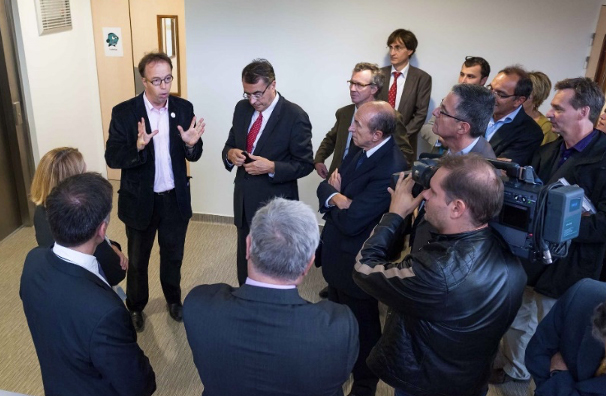
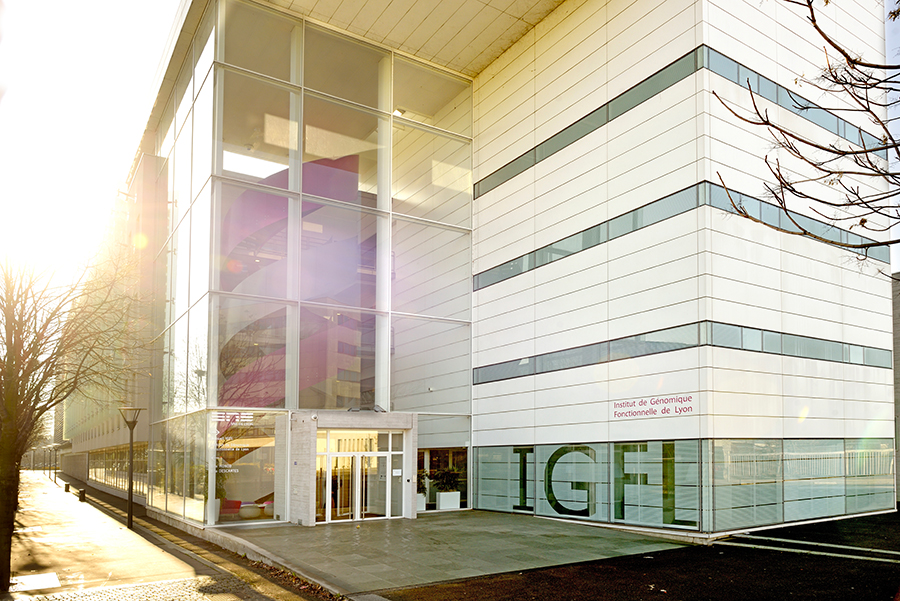
Inauguration officielle du bâtiment de l'IGFL en octobre 2012 Le bâtiment de l'IGFL ©Vincent Moncorgé
Ces équipes utilisent une variété de modèles animaux conventionnels : souris, poisson-zèbre et médaka, drosophile, et des modèles non conventionnels issus de la nature : poissons poeciliidés (guppies), crustacés, insectes semi-aquatiques (gerridés). Dès son entrée dans le bâtiment, l'IGFL a investi dans les technologies de séquençage à haut débit et la Plateforme de Séquençage de l'IGFL (PSI) a été officiellement créée peu après avec Sandrine Hughes (CR CNRS) et Benjamin Gillet (IR CNRS) à sa tête et le soutien de l'ENS de Lyon. L'IGFL se dote également de capacités en imagerie de proximité, complémentaires de celles présentes dans la plateforme d'imagerie avancée de la SFR Biosciences sur le campus de Lyon-Gerland. Sous l'impulsion de la direction, un club de mécènes de l'IGFL a été lancé, mais il n'a reçu le soutien que d'une seule entreprise et a été abandonné trois ans plus tard faute d'avoir pu inclure d'autres partenaires. Remercions ici la société Silab qui par son adhésion au programme a permis de cofinancer l'achat d'équipements dont ceux des plateformes de séquençage et d'imagerie de l'IGFL.
2013
L'appel d'offre lancé cette année là permet le recrutement de deux nouvelles équipes, le bâtiment est complet (15 équipes) : Hugo Aguilaniu migre localement du LBMC vers l'IGFL et apporte un nouveau modèle à l'IGFL (le ver Caenorhabditis elegans), il obtient une ERC CoG en 2015, et Nicolas Goudemand (ANR Emergence puis recruté comme Professeur à l'ENS Lyon) qui renforce la dimension paléobiologique de l'Institut. Fin 2013, l'IGFL organise son colloque scientifique inaugural centré sur son ADN : l'évolution, le développement et la physiologie animale et leurs interfaces.

Symposium scientifique inaugural de l'IGFL en octobre 2013
2014
Une nouvelle ère s'ouvre pour l'IGFL avec l'annonce des premiers départs des dirigeants des équipes "fondatrices" (P. Jurdic puis J. Samarut). Florence Ruggiero est sollicitée pour prendre place dans la prochaine direction et est nommée directrice adjointe de l'IGFL. Elle supervise l'appel d’offre 2014 au cours duquel est recruté Kiran Padmanabhan qui obtient un financement ATIP-AVENIR pour s'installer à l'IGFL début 2016.
2015
Vincent Laudet est le dernier des 3 fondateurs à quitter l'IGFL pour prendre la direction de l'Observatoire océanologique de Banyuls-sur-mer. Florence Ruggiero assure l'intérim jusqu'à la fin du mandat de l'unité en décembre 2015.
2016
Florence Ruggiero est nommée directrice de l'IGFL pour la période 2016-2020. Elle est soutenue par Frédéric Flamant qui a une très bonne connaissance de l'histoire de l'IGFL et du site de l'ENS de Lyon en tant que directeur adjoint. Deux nouveaux chefs d'équipe sont recrutés pendant son mandat lors de l'appel 2016, Yad Ghavi-Helm, lauréat d'un ATIP-AVENIR puis d'un ERC StG, et Jonathan Enriquez, lauréat d'un ATIP-Avenir, tous deux bénéficient également du soutien de la FRM pour démarrer leur groupe. L'IGFL continue à recruter avec succès ! Au cours de cette période, l'IGFL compte 14 équipes, dont 5 ERC :
Aguilaniu: Vieillissement, reproduction and métabolisme
Averof: Biologie comparative du développement et de la régénération
Bleicher: Physiopathologie des odontoblastes
Enriquez: Développement et fonction du système neuromusculaire
Flamant: Neurodéveloppement
Ghavi-Helm: Épigénomique développementale
Goudemand: Biomodélisation
Khila: Génomique du développement et évolution
Leulier: Physiologie integrative des interactions hôte-microbes
Merabet: Ontogénèse et interactions moléculaires
Padmanabhan: Contrôle moléculaire et épigénétique des rythmes biologiques
Ruggiero: Biologie et pathologie des matrices extracellulaires
Volff: Génomique évolutive des poissons
Vanacker: Physiopathologie des récepteurs nucléaires orphelins
Viriot: Evo-Devo de la dentition des vertébrés
Florence Ruggiero s'est attachée à créer de nouveaux espaces de travail, à moderniser les plateformes internes, y compris d'imagerie (sous la supervision de deux ingénieures CNRS expertes Marilyne Duffraisse et Marilyne Malbouyres), à optimiser les interactions entre expérimentateurs et à rationaliser l'espace, à les équiper (nouveau confocal sur le plateau technique d'imagerie de l'IGFL en 2018, équipement Illumina sur la plateforme de séquençage de l'IGFL - avec l'aide de nos tutelles) et de restructurer les animaleries et les salles d'expérimentation animale - celles des invertébrés aquatiques, agrandissement des salles des drosophiles et de l'animalerie des souris avec la création d'une « chambre noire » pour l'équipe Padmanabhan. Répondant à un appel d'offre de l'ENS de Lyon, la plateforme PSI s'est agrandie fin 2017 pour être localisée sur 2 sites (IGFL et Monod). Dans ces nouveaux locaux, la plateforme comprend des salles blanches dédiées au travail sur des ADN dégradés, délicats ou en quantité limitée mis à disposition de la communauté scientifique locale et externe. Au cours de cette période, l'IGFL a également connu deux départs de chefs d'équipe, Hugo Aguilaniu en 2017 et Laurent Viriot en 2019. En 2018, les deux candidats sélectionnés lors d'un appel d'offre pour le recrutement d'une nouvelle équipe qui comporte pour la première fois une phrase encourageant les femmes à postuler, ne rejoignent finalement pas l'unité, la compétition internationale devenant de plus en plus rude !
Florence Ruggiero institue la première retraite IGFL qui sera organisée en mai 2018 par le personnel de l'unité. Il était essentiel de mettre un lien entre toutes ces équipes nouvellement recrutées et les nouveaux et anciens collaborateurs. Aussi à mi-parcours, en préparant un bilan pour la retraite, il est apparu qu'il manquait une brique à l'IGFL, l'obtention d'un projet de type LABEX/EQUIPEX. Florence Ruggiero encourage vivement les chefs d'équipe à répondre aux appels à propositions -EX.
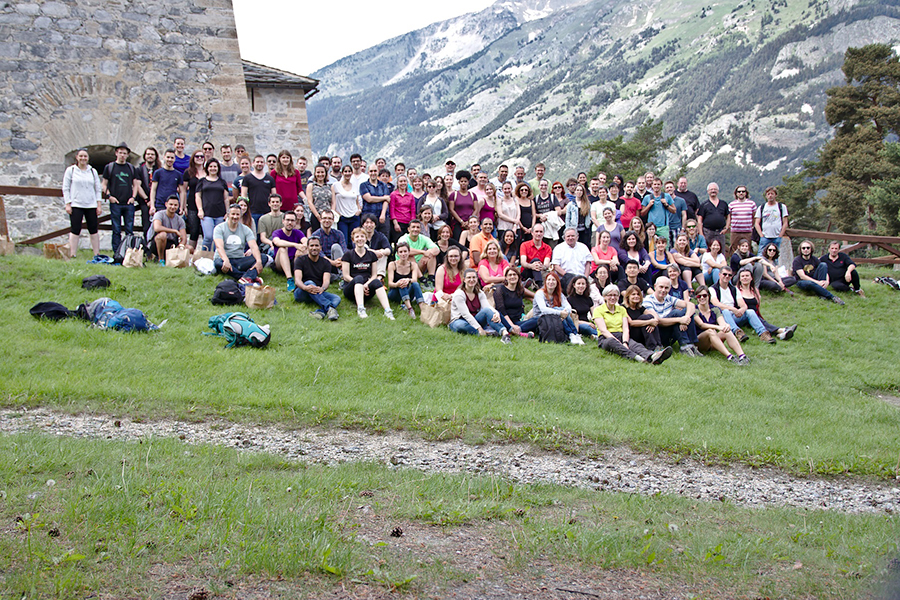
Première retraite de l'IGFL à Aussois en Juin 2018 ©JF Metifiot
2019
Florence Ruggiero ayant annoncé son intention de ne pas viser un second mandat à la tête de l'IGFL, François Leulier rejoint la direction en septembre en tant que second adjoint afin de se préparer à prendre la tête de l'unité pour la prochaine mandature (2021-2025). Le projet ERGO, dans lequel l'équipe de Frédéric Flamant est fortement impliquée, est lauréat d'un appel à proposition européen H2020.
2020
A l'ouverture de l'appel à projet PIA3 EQUIPEX+, Yad Ghavi-Helm et Jonathan Enriquez, répondant à l'appel lancé par Florence Ruggiero, lèvent la main et travaillent d'arrache-pied lors du premier confinement COVID pour présenter un projet fédérateur multi-sites atypique pour un EQUIPEX liant imagerie et génomique par des approches de transcriptomique spatiale. Fin 2020, le projet Spatial-Cell-ID, co-sponsorisé par l'IGFL (Yad Ghavi-Helm et Jonathan Enriquez) et le RDP (Olivier Hamant) et géré par l'ENS de Lyon, a été financé.
Durant cette année de transition à la direction, les 3 candidats retenus lors de l'appel à projet 2020 pour de nouvelles équipes n'intègrent pas l'IGFL, la concurrence nationale et internationale est toujours très forte. Il a alors été décidé d'ajuster notre stratégie de recrutement en lançant une série d'invitations ciblées avant nos appels d'offres et d'ajouter à notre appel d'offre l'annonce publique d'un budget d'installation financé par les ressources propres de l'unité accumulées grâce au succès des équipes de l'IGFL dans les appels d'offres européens. L'effort de recrutement de nouveaux chefs d'équipe est maintenu. Fin 2020, une autre équipe, celle de Kiran Padmanabhan, est lauréate d'un projet européen H2020. Il s'agit du projet REVEAL pour lequel l'équipe est partenaire.
2021
François Leulier est nommé directeur pour le nouveau mandat de l'unité prolongé d'un an en raison du COVID (2021 - 2026). Sa proposition de directeur adjoint n'ayant pas été retenue par nos autorités de tutelle, et suite au départ de notre coordinatrice de recherche, Joanne Burden, qui a accompagné avec beaucoup de compétence et de finesse les différentes orientations du projet IGFL depuis sa création, il est entouré d'une équipe de direction opérationnelle. Cette équipe est composée de Fabienne Rogowsky (administration et finances), Benjamin Gillet (logistique et sécurité) et Jean-Louis Thoumas (infrastructures techniques et scientifiques), aussi soutenus par des chefs d'équipe et des chercheurs de l'institut. Un groupe de travail est également en cours de constitution pour engager notre transition écologique. Les membres de l'IGFL répondent très positivement à ces initiatives et s'engagent fortement dans ces groupes qui travaillent en synergie avec le conseil de laboratoire.
Groupes de travail IGFL 2021-2026
Equipement / Magasin / Bien vivre à l'IGFL / Formation / Développement durable / International / Carrières / Structure d'écoute / Transfert de technologie.
Dans la continuité de l'investissement historique de l'IGFL (Florence Ruggiero puis Pierre Jurdic) dans l'équipe de direction de l'UMS/UAR Biosciences, Samir Merabet, chef d'équipe à l'IGFL, est nommé directeur de l'UAR Biosciences. Un nouveau modèle de poisson est accueilli à l'IGFL, de la famille des Cichlidae, grâce à un financement ANR obtenu par les équipes Goudemand et Ruggiero. Un espace d'élevage et d'expérimentation dédié a alors été mis en place avec l'aide de l'IGFL, de l'UAR Biosciences et de l'ENS de Lyon. Afin d'accompagner son développement, la direction a proposé à la plateforme de séquençage de l'IGFL de s'installer dans de nouveaux locaux plus spacieux au deuxième étage. Dans la même logique, l'équipe de Goudemand, initialement au premier étage, déménagera au troisième étage. Fin 2021, l'équipe de Jean-Nicolas Volff cesse ses activités.
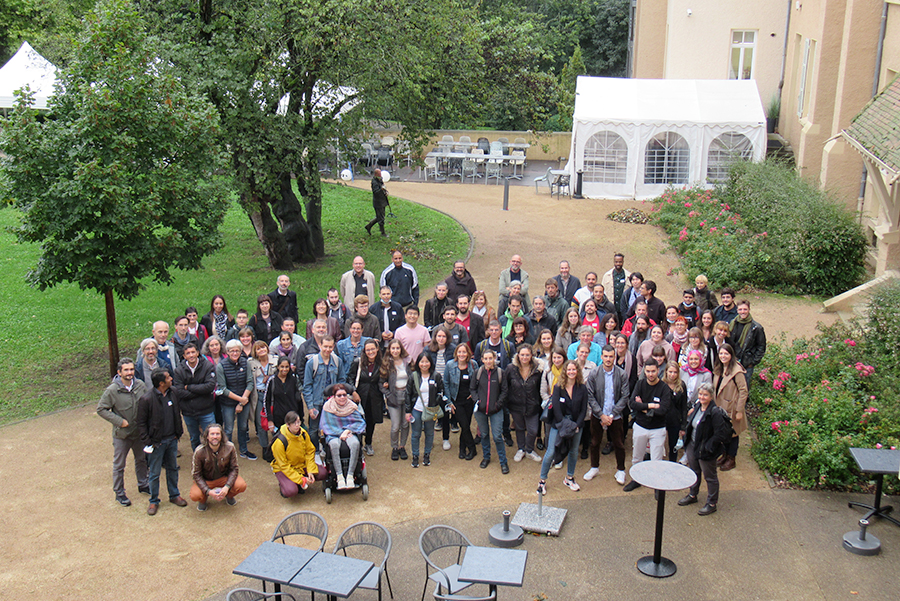
Journée IGFL à Sainte-Foy-lès-Lyon en Juin 2021
2022
Le service administratif de l'unité, aidé par de nombreux membres de l'unité, entame la refonte du site intranet de l'unité afin de fluidifier nos modes de fonctionnement. C'est l'occasion de remercier notre responsable administrative et financière Fabienne Rogowsky et notre webmaster Christelle Forcet ainsi que leurs collaborateurs pour leur aide efficace et indispensable dans la conduite de nos activités de recherche.
La direction et les membres de l'IGFL travaillent à l'intégration de Clémence Bernard, lauréate de notre appel d’offre 2022, qui est prévue pour fin 2023. L'équipe de Jean-Marc Vanacker met fin à ses activités. 3 espaces de laboratoires sont à nouveau disponibles pour accueillir de nouvelles équipes, une nouvelle dynamique de recrutement doit être initiée.
2023
L'unité est désormais composée de 10 équipes et de 3 plateaux techniques :
Averof: Biologie comparative du développement et de la régénération
Enriquez: Développement et fonction du système neuromusculaire
Flamant: Neurodéveloppement
Ghavi-Helm: Épigénomique développementale
Goudemand: Biomodélisation
Khila: Génomique du développement et évolution
Leulier: Physiologie integrative des interactions hôte-microbes
Merabet: Ontogénèse et interactions moléculaires
Padmanabhan: Contrôle moléculaire et épigénétique des rythmes biologiques
Ruggiero: Biologie et pathologie des matrices extracellulaires
Séquençage
Imagerie-histologie
Experimentation sur les organismes vivants
L'IGFL se prépare à accueillir le nouveau microscope haute résolution de l'Equipex+ Spatial-Cell-ID et sa plateforme de séquençage poursuit ses développements autour des technologies de séquençage "nanopore" et "long fragment". Le premier bilan carbone de l'unité établi par le GT Développement Durable avec l'aide des services administratifs de l'IGFL est présenté à l'Assemblée Générale. Engager notre transition écologique, avec nos tutelles, sera un des objectifs forts pour 2023. Les chefs d'équipe et le SAB de l'IGFL réfléchissent à réorganiser le recrutement de nouveaux groupes IGFL, il est décidé d'ouvrir un appel d'offre en continu avec pré-évaluation des candidatures " au fil de l'eau " et organisation de mini-symposiums de recrutement tous les 6 mois en présence de notre SAB.
Le colloque anniversaire des " 10 ans " de l'IGFL a eu lieu en mars 2023. Initialement prévu à l'automne 2022, il a été retardé en raison du COVID. Officiellement notre unité a été créée il y a 16 ans mais notre arrivée dans le nouveau bâtiment date d'un peu plus de 10 ans. Ce symposium était donc l'occasion pour nous de le célébrer. Profitons-en pour féliciter le travail de notre responsable logistique et sécurité, Benjamin Gillet, récemment secondé par notre intendant et nos assistants de prévention, accompagnés par les services de notre établissement d'accueil, l'ENS de Lyon, qui œuvrent chaque jour depuis plus de 10 ans pour que notre principal outil de travail reste conforme aux normes de sécurité, et soit toujours aussi impeccable et fonctionnel, afin que nous puissions exercer nos missions dans un environnement de travail confortable et de qualité.
Ce colloque a été un moment scientifique fort, de réflexion sur la science d'aujourd'hui et de demain, mais aussi de convivialité que nous avons eu plaisir à célébrer avec tous ceux qui ont contribué et contribuent au succès de l'IGFL et qui, nous n'en doutons pas, porteront ses futurs succès.
12 March 2023. François Leulier avec l'aide de Jacques Samarut, Frédéric Flamant, Vincent Laudet et Florence Ruggiero.



